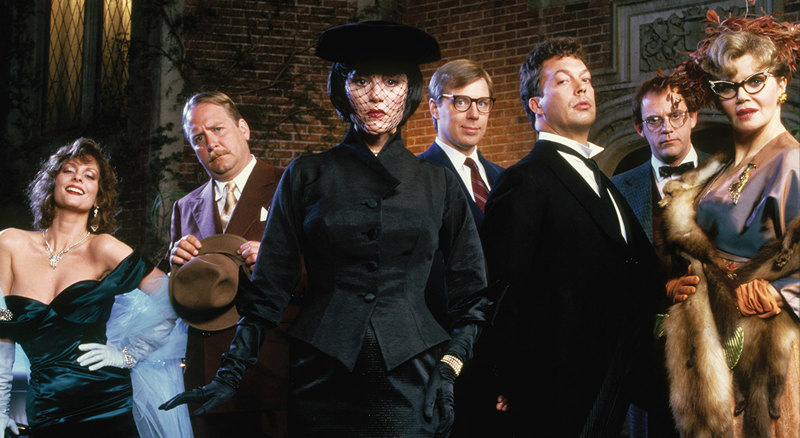Although “Heavyweights” is a 1995 film, it’s a throwback to the early Disney live-action films that coasted on their premises and were content to provide lightweight entertainment and nothing more. This one begins like “Meatballs” and ends like a summer camp version of “9 to 5.”
It’s written by Judd Apatow and Steven Brill, produced by Apatow, and directed by Brill (“Little Nicky,” “Mr. Deeds”).
In “Heavyweights,” Ben Stiller fans get to see their guy buff (not IN the buff, mind you, but totally ripped). In his 11th feature film, Stiller plays Tony Perkis, a physical fitness freak who turns a fun camp for fat boys run by a kindly couple (Stiller’s real-life parents, Jerry Stiller and Anne Meara) into a sadistic weight-loss boot camp. His motivation? He’s shooting footage of everything, hoping to use it in an informercial for a weight-loss method he thinks will make him ridiculously rich. So he replaces all the easy-going staffers with a bunch of neo-Nazis in black spandex—one of whom (Tom Hodges) actually speaks with an exaggerated German accent.
Stiller doesn’t just flex his way through the sequences—he climbs, he does flips, he does sit-ups and push-ups, he contorts, he runs, he leaps over tall buildings, and I’m sure he has some assistance from a stunt man. But he’s still in the best shape of his professional life—like Derek Zoolander on steroids, and with an attitude.
What begins as a point-of-view narrative spotlighting a first-time camper quickly turns into an ensemble film, with the boy absorbed by the camp, the campers, and the predicament that results when the owners announce they’ve been bought out and forced to retire. At some point one of the counselors (Tom McGowan as Pat Finley) breaks out as a second focal point, with new nurse Leah Lail as his potential love interest, but it remains, really, one big ensemble. The kids include now-SNL star Kenan Thompson, David Goldman, Joseph Wayne Miller, Cody Burger, and Allen Covert.
After a quick set-up to establish paradise before the fall, it feels like a two-act screenplay, with the first act the equivalent of “Stripes” basic training for the boys, and the second act their revenge. But “revenge” is probably too strong a word for a film like this, and Judd Apatow fans will be surprised at how relatively wholesome the screenplay is, how lacking it is in foul language and bodily function humor. Still, I can’t imagine gross-out humor adding a whole lot. The premise is what it is, and it’s mildly entertaining and equally mildly humorous. As I said, the fun for most people will be to watch Stiller and a young Thompson work through it.
Video:
“Heavyweights” is presented in 1.85:1 widescreen, and while the AVC/MPEG-4 transfer seems to be a good one—with no visible artifacts, banding, or excessive DNR—a number of scenes look slightly soft, with colors slightly undersaturated. That’s my only complaint, though, in the video department. The level of detail in close-ups and medium shots reminds you you’re watching the film in HD, and though most of the scenes look to have been shot using natural light, they’re consistently bright and Camp Hope cheery.
Audio:
The featured audio is (big surprise) an English DTS-HD 5.1, with Spanish Dolby Digital 5.1 an additional option and subtitles in English SDH, French, and Spanish. It’s not a dynamic or blow-you-away soundtrack, by any means. The locus of sound is dead center, with not nearly as much rear-action ambient sounds as you’d expect from an outdoor location. Which is to say, the soundtrack is unspectacular but perfectly suitable, with dialogue that’s clean and clear.
Extras:
There’s a commentary featuring Apatow, Brill, and actors Allen Covert, Paul Feig (briefly, via telephone), Tom Hodges, Aaron Schwartz, and Shaun Weiss that covers all the bases you can think of, and then some—including actual fat camps, allusions that had to be cut, and the film’s legacy. It’s worth listening to, but I much preferred the 25-minute vintage “making of” feature, which includes the usual blend of behind-the-scenes shots, film clips, and talking heads. This little feature is more “in the moment” and the time capsule aspect is appealing. The whole Stiller family appears, along with Apatow, Brill, Hodges, Tom McGowan, and Leah Lail, and it’s interesting to see the difference in Apatow’s and Brill’s responses.
But the big bonus for fans is collection of 35 deleted scenes that run 94 minutes—just three minutes shorter than the film itself! All of the stuff that Disney insisted be cut appear here, and that includes some off-color and suggestive scenes, some pop culture references ala “The Simpsons,” and a full version of the Camp Hope promo.
If you’re wondering “Where Are They Now?” there’s a 15-minute feature that catches you up with the child actors . . . unfortunately (and inexplicably?) minus Thompson. Really? He’s that big? Or his agent wanted that much more money for a bonus feature?
Maybe that’s why we also get “Video Chat: Judd & Kenan,” an eight-minute chat between the two over their memories of the film. Finally, there’s a “Super 8” (9 min.) raw footage montage, “Judd’s Art Project” (an art gallery of Polaroid shots that plays for about a 2-minute slideshow), and the original trailer.
In other words, there’s a surprising amount of bonus features for a title like this.
Bottom line:
Though the bonus features say “Heavyweights” has become a cult classic, I’m not sure how big that cult is. But I will say that if I were locked in a room and forced to watch one kids-at-camp film over and over again, I’d pick “Heavyweights” over “Meatballs” quicker than you can say “infomercial.” There are more laughs, and the characters are low-maintenance—the kind I’d like to have a beer with, when they grow up. I’m just surprised that Apatow couldn’t convince Disney to release this in two versions, theatrical and director’s cut, given all of the fun stuff that didn’t make the final print.


